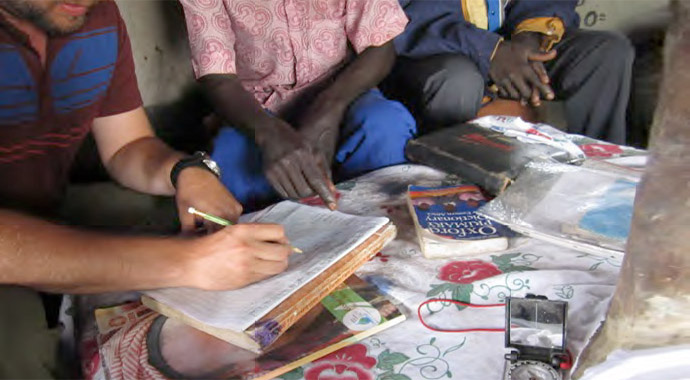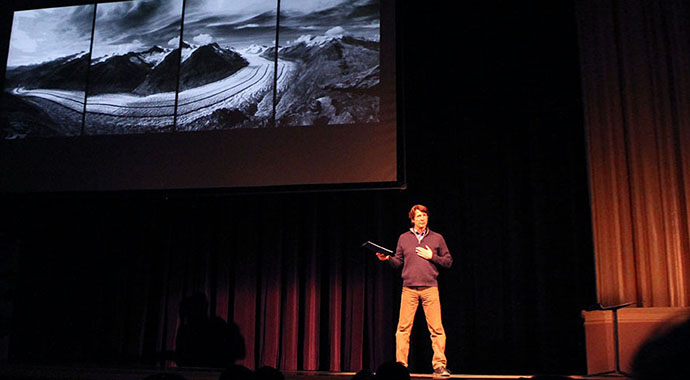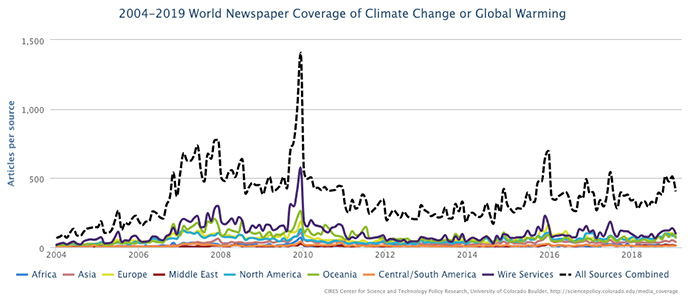CSTPR Projects Seeking Support
 Your gift can help CSTPR clarify science and technology issues for policy makers at the local and national levels ...
Your gift can help CSTPR clarify science and technology issues for policy makers at the local and national levels ...
All donations (which are made through the CU Foundation) are tax-deductible to the fullest extent of the law. Circumstances vary depending on each donor’s individual financial situation, so you should consult with your tax attorney/advisor concerning the deductibility of your gift. See the University of Colorado Foundation website.
Inside the Greenhouse (ITG): Building Capacity for Creative Climate Communications
Led by Professor Max Boykoff | Project Website
Inside the Greenhouse sponsored a multimedia presentation by James Balog in April 2013.
Creative framing and storytelling of issues surrounding climate change through video, theatre, dance, and writing can connect a wider audience to the deep and pressing need to address climate change. Project leaders Max Boykoff (CIRES Fellow) in collaboration with Professors Rebecca Safran (Associate Professor, Ecology and Evolutionary Biology) and Beth Osnes (Assistant Professor, Department of Theater and Dance) have been producing events and classes over the past four years under the banner of the ‘Inside the Greenhouse’. Support for this work catalyzes creative climate communication and builds capacity among CU-Boulder undergraduate students in particular. Our efforts to engage our students and the public alike seek to help concerned citizens to grasp the challenges of making climate change meaningful for everyday people. Students are involved directly and collaboratively connecting work in the classroom to ‘real world’ applied contexts.
Media and Climate Change Observatory (MeCCO)
Led by Professor Max Boykoff | Project Website
This figure tracks newspaper coverage of climate change or global warming in sixty-six sources across thirty-six countries in seven different regions around the world. Updated through January 2019.
This observatory analyzes traditional/legacy media representations of climate change. With additional funding, the group of CU-Boulder graduate student and postdoctoral researchers (along with CU-Boulder Professor Max Boykoff and collaborators in Japan and Spain) endeavor to comprehensively aggregate, monitor, appraise and critically examine media coverage – from newspapers, tv and radio to new, social and digital media – that influence the spectrum of possibility for effective responses to ongoing climate challenges. At present, the MeCCO team monitors coverage monthly in 79 sources (across newspapers, radio and TV) in 39 countries in seven different regions around the world. With further funding support, the MECCO team will scale analyses out to provide resonant and useful information for a range of consumers, from local practitioners to elected officials and academic researchers.
Through ongoing discussions with colleagues in intersecting research communities, as well as through interactions with practitioners (e.g. political actors, resource managers) about areas of research need, the absence of a central hub (or observatory) where methodologically-consistent and high-quality monitoring, aggregation and assessment of media communications on climate change in the social sciences has been a striking shortfall amidst comprehensive monitoring of dimensions of climate change from the natural sciences. With funding, MeCCO in CIRES CSTPR at CU-Boulder can distinguish itself as that national and international resource for observation, monitoring and analysis of media representations of climate change in the public sphere.
As a baseline, we seek $50,000 per year to provide capacity and equipment to establish this program.
Red Cross/Red Crescent Climate Centre Fellowship Program
Led by Professor Max Boykoff | Project Website

Red Cross/Red Crescent fellow, Drew Zackary, working with community members in Uganda.
Through collaborations between CIRES CSTPR and the Environmental Studies Program, CU-Boulder has partnered with the Red Cross/Red Crescent Climate Centre (RCRCCC) to place graduate students in locations in eastern and southern Africa for approximately three months each summer. This collaborative program targets improvements in environmental communication and adaptation decision-making as well as disaster prevention and preparedness in the humanitarian sector. It connects humanitarian practitioners from the Red Cross/Red Crescent Climate Centre – an affiliate of the International Federation of Red Cross and Red Crescent Societies – with graduate student researchers at the University of Colorado who are interested in science-policy issues. Through this program we strive to accomplish three key objectives:
- To improve the capacity of humanitarian practitioners within International Federation of Red Cross and Red Crescent Societies network at the interface of science, policy and practice;
- to help meet needs and gaps as well as work as a research clearing house in environmental communication and adaptation decision-making in response to climate variability and change, as identified through Red Cross/Red Crescent Climate Centre priorities and projects;
- to benefit graduate students by complementing the classes and research that they undertake in their graduate program with real-world experience in climate applications and development work.
Students design their own program of work in conjunction with CU-Boulder Director Max Boykoff and RCRCCC supervisors. The RCRCCC supervisors liaise with specific IFRC field offices to identify potential projects and placements. Placements in the field address specific needs identified by IFRC field staff related to challenges of science communication and adaptation decision-making.
Selected RCRCCC fellows are provided with round-trip airfare to their field site, with travel to be organized through the University of Colorado. RCRCCC fellows also receive a stipend to offset costs of in-country housing, food, and transportation. Typically, expenses amount to approximately $5,000 per placement, but these can vary widely depending on the location and nature of the placement. The fellowship is unpaid.
Projects have involved topics such as analysis of uses of regional climate forecasts to trigger anticipatory humanitarian action, and examinations of ways to improve the linking of science-based forecasts with humanitarian decisions. More information on the specifics of all these placements and activities can be found here.
The funding requested for this opportunity is scalable. Overall, we seek to support the placement expenses for students ($5k per student per year) as well as the graduate co-coordinator support provided by former RCRCCC fellows here at CU-Boulder ($1k per student per year).


